独家 | 火车站这样设计媲美航站楼?欧洲“最复杂”项目幕后解读
建筑师在荷兰七个城市建立新的交通枢纽
城市枢纽:火车站
游走荷兰实在是一件惬意的事。这里大多数人尤其是年轻人喜欢骑自行车或者乘坐有轨电车出门,如果距离更远就选择便宜又快捷的火车。每座城市都有指定的自行车道和充足的自行车停车位,目的就是将小汽车的使用率降到最低,带给市民更整洁的街道、更清新的空气同时节约能源。这也得益于荷兰国土小而平坦(不用穿山越岭),且这个国家充满了公共凝聚力。
Getting around the Netherlands is a breeze. A majority of the population, especially the young, use bicycles and trams on home ground and a network of fast, inexpensive trains for longer distances. Every city has designated lanes and ample parking for bicycles, and the goal is to reduce car usage to a minimum. That brings uncluttered streets, cleaner air and energy savings. It helps that the Netherlands is small and flat--no mountains to scale or tunnel through--and imbued with a strong sense of communal effort.
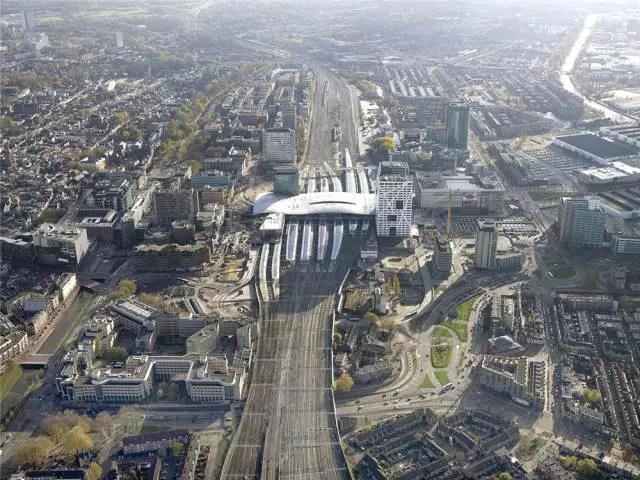
(c) Jannes Linders, courtesy Benthem Crouwel
过去二十年里,顶尖的建筑师们拿下了在荷兰几个大城市设计大型火车站的招标项目,来满足市民在乘坐高速列车时和其他交通工具之间的快速换乘。全欧洲有一个普遍的现象:随着国界线越来越被淡化,这片大陆,从柏林到马德里,从巴黎到那不勒斯,已经被高速线路紧紧地联系在一起。
壮观的新车站象征着便捷和速度上的一次改革,正如19世纪宫殿式的火车站曾经代表着火车旅行时代的开启。尽管这些见证近代交通史的车站几经翻新和扩建,但有时候也需要一次全面的更新。
Over the past two decades, leading architects have won competitions to design greatly expanded stations in major Dutch cities--to accommodate crowds, high-speed trains, and seamless interchanges with every other form of transportation. It's a pan-European phenomenon: as national boundaries have eroded, the continent has been knitted together with high-speed lines that run from Berlin to Madrid, Paris to Naples. Spectacular new stations symbolize the revolution in convenience and speed, just as the palatial 19th-century stations celebrated the new-fangled marvel of rail travel. Those imposing monuments have been refurbished and enlarged, but sometimes a fresh start is needed.
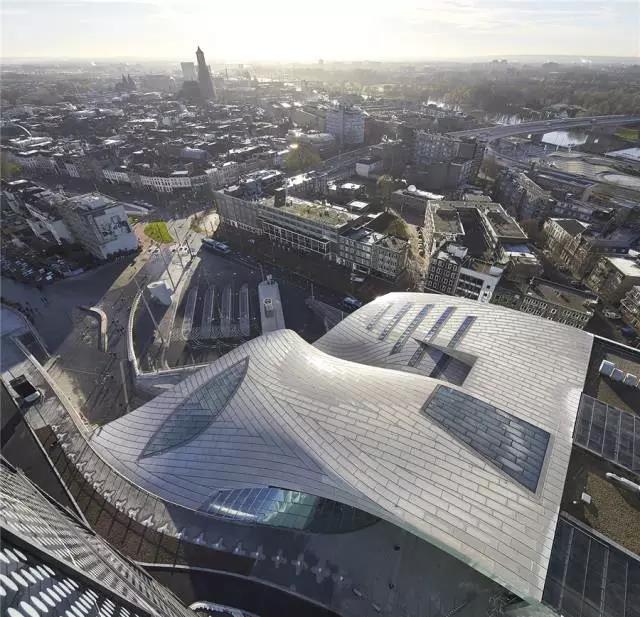
(c) Hufton + Crow, courtesy UN Studio
荷兰提升了建筑规模和质量的标准,也提升了这些多层火车站作为商业发展枢纽的系统设计方式。新设施的重点不在于国际线,而更多关注日常服务,与市民、通勤者、游客和商务旅客建立联结。事实上,荷兰是最后加入欧洲高速网络的国家之一,而且至今只有一条路线,连接巴黎和鹿特丹、史基浦机场及阿姆斯特丹。另一条延伸到德国的路线还在建设中。
The Dutch have raised the bar--in the scale and quality of the architecture, and the systematic way these multi-level stations have been designed as hubs of commercial development. The new facilities focus on quotidian services more than the international lines, and they are thronged with residents and commuters, as well as tourists and business travelers. In fact the Netherlands was one of the last countries to join Europe's high speed network, and still has only a single route, linking Paris to Rotterdam, Schiphol Airport and Amsterdam. A second line extending to Germany is still under construction.
荷兰的铁路在九十年代就被私有化,这激发了几个主要火车站服务范围扩大和设施现代化的倡议,但是多个宏大的计划因耗资巨大而被放弃。发展是相对缓慢的,改造或者重建这七个火车站共花了近20年,不过现在已全部竣工,其他城市也紧随其后跃跃欲试了。
Dutch railways were privatised in the 1990s, and that spurred the initiative to greatly expand services and modernize key stations, but several ambitious plans were abandoned as too costly. Development was slow: it took up to 20 years to transform or rebuild these seven stations, but they are now complete and other cities are keen to follow their example.
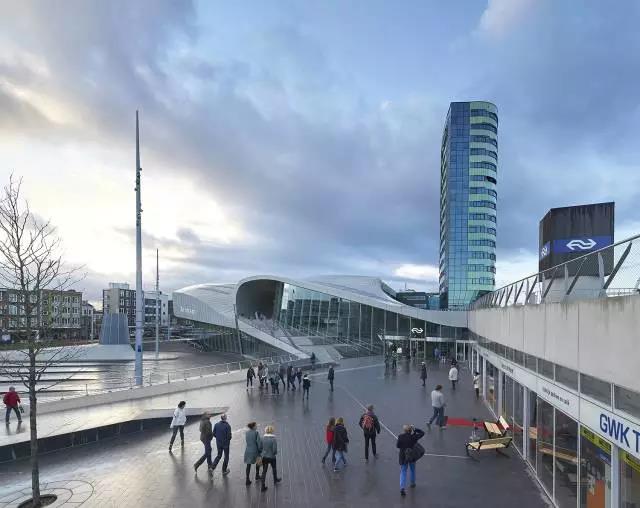
(c) Hufton + Crow, courtesy UN Studio
鹿特丹, 阿姆斯特丹, 乌得勒支及海牙火车站
BethemCrouwel 建筑事务所
(联合设计)
BethemCrouwel建筑事务所曾经设计过史基浦机场的航站楼和车站。凭借经验优势,他们被选中设计阿姆斯特丹、乌得勒支和海牙的火车站,联合设计鹿特丹车站,并建设代尔夫特的基础设施。共同负责人扬·本特姆(Jan Benthem)面临的挑战是调和各方利益冲突,重建车站的同时不中断火车服务,为居民和游客创造一个舒适的环境。
他解释说:“早期的车站建在城市边缘,有着夸张的外观,周边则是混杂交错的线路和场地,所以难以提供理想的居住环境。现在车站大多建在城市的中心地带,我们需要消除车站之前给人的负面印象,使它们成为生活的连接者而不是分隔者,要知道我们的车站并不会建得像城市广场那么多。”
The firm of Bethem Crouwel gained experience designing terminals and a station at Schiphol Airport. That gave them an advantage and they were selected to design the stations of Amsterdam, Utrecht, and The Hague, to collaborate on Rotterdam, and create the infrastructure of Delft. Co-principal Jan Benthem was challenged to reconcile competing interests, rebuild stations without interrupting the train service, and create a welcoming environment for residents and visitors. As he explains, "Early stations were built at the edge of cities with impressive facades and and a tangle of lines and yards behind, making that an undesirable place to live. They now occupy central locations in the cities, and we need to eliminate the back side and make them connectors, not dividers. Our stations are not so much buildings as covered city plazas."
#
鹿特丹中央火车站
在鹿特丹,BethemCrouwel与Meyer en Van Schooten及景观建筑机构West 8作为CS团队完成了一项联合提案。他们紧密合作,也与城市方和铁路公司方建立了密切的联系。他们一起致力于给这个城市和这个国家设计一个有价值的通道。
In Rotterdam, his firm made a joint proposal with Meyer en Van Schooten, and the landscape architects West 8. Working as Team CS, they forged close links among themselves and with representatives of the city and the railway company. Together, they insisted on a design that would be a worthy gateway to the city and to the country itself.
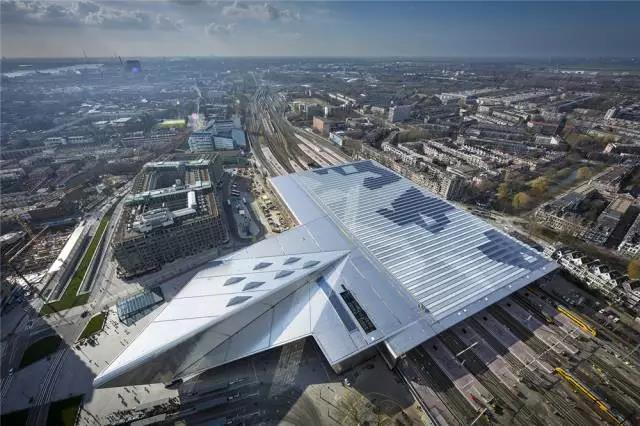
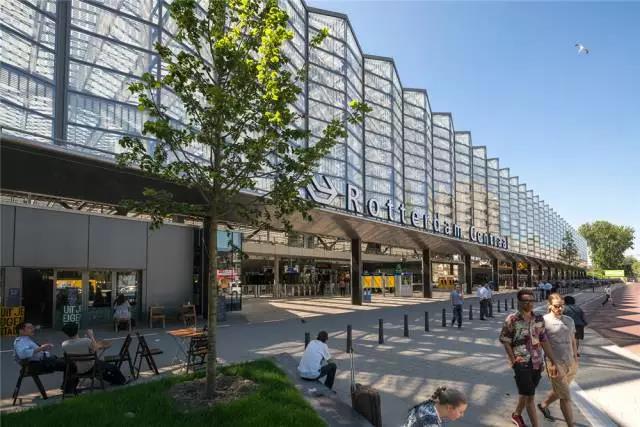
(c) Jannes Linders, courtesy Benthem Crouwel
鹿特丹在1940年遭遇过德国空袭袭击,重建后的新城比传统的荷兰城市更大也更松散。鹿特丹火车站象征了新的发展浪潮,但也保留了旧建筑的元素来承载城市的记忆。长250米的透明顶部保护着所有的站台,这些站台由一个宽阔的大厅连接起来,形成一个高耸的木结构门厅。
Rotterdam was devastated by German air-raids in 1940, and was rebuilt on a larger, looser scale than traditional Dutch cities. The station is the symbol of a fresh wave of development, but it incorporates memories of the much-loved old building. A transparent roof 250 meters long protects all the platforms, which are linked by a broad concourse leading into a soaring wood-lined entry hall with a cantilevered prow pointing south to the center city.
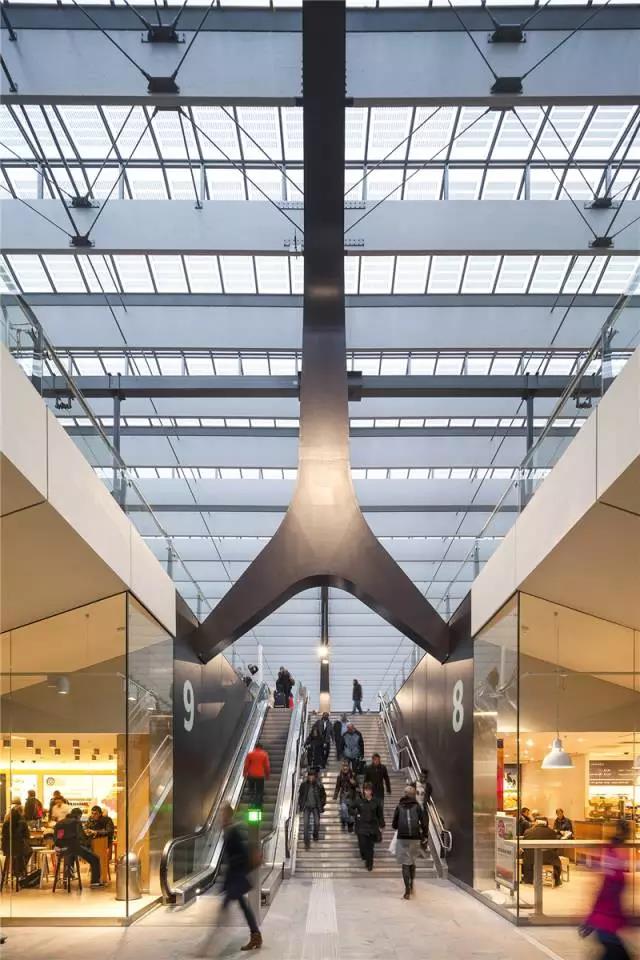
(c) Jannes Linders, courtesy Benthem Crouwel
悬臂式的舱头指向城市中心。折叠的玻璃屋顶使得北立面更加柔和,和周边19世纪风貌的建筑风格相融合。
The glass roof is folded down to create a more subdued north elevation to match the scale of a 19th-century district.
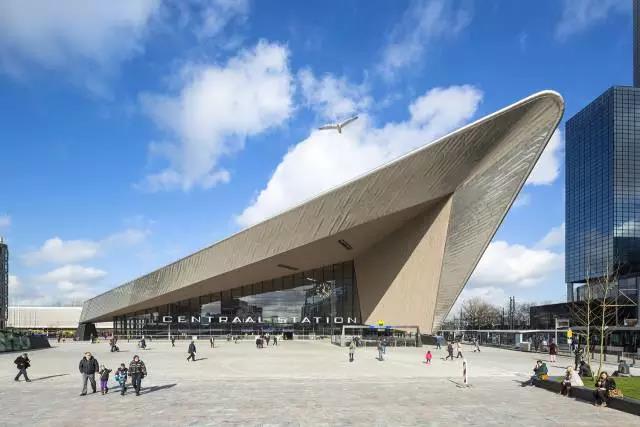
(c) Jannes Linders, courtesy Benthem Crouwel
鹿特丹中央火车站是明朗结构的典范。地铁入口设在中心;
Rotterdam Centraal is a model of lucid organization, with a metro entrance at the center;
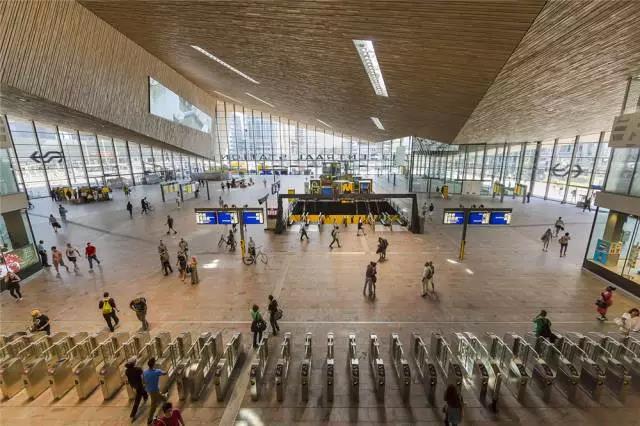
(c) Jannes Linders, courtesy Benthem Crouwel
东侧是有轨电车;西侧是公共汽车、出租车和一个巨大的自行车车库。
trams on the east side; buses, taxis and a huge bicycle garage to the west.
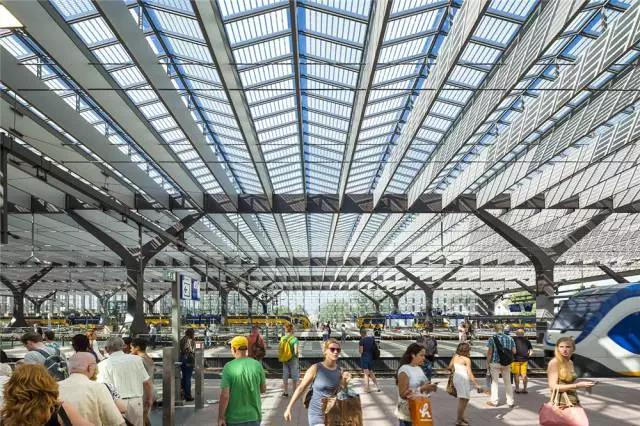
(c) Jannes Linders, courtesy Benthem Crouwel
即使在全年比较潮湿的气候条件下,大厅也充满了自然光线,太阳能板起到部分遮阳效果。
Even on the frequent wet days, the concourses are infused with natural light, partially shaded by solar panels.
#
阿姆斯特丹火车站
在阿姆斯特丹,建筑师的改造对象是建于1889年的主车站,这是一个在新文艺复兴时期用装饰砖堆砌的建筑。
In Amsterdam, the architects had to work within the shell of the 1889 main station, a neo-Renaissance pile of ornamented brick,
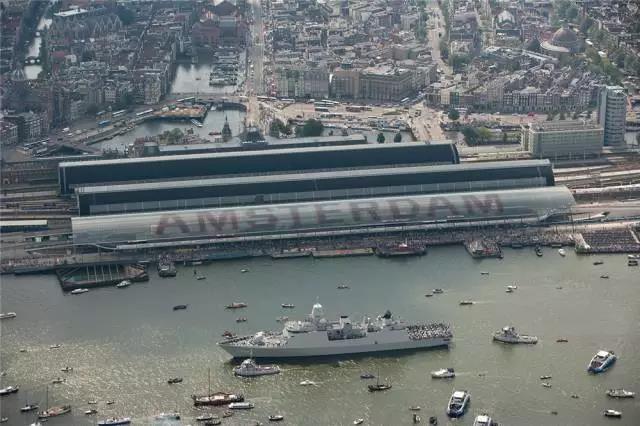
(c) Jannes Linders, courtesy Benthem Crouwel
改造后每天可容纳30万名乘客,是原始客流量的十倍。高档商店列于两旁的中央大厅可直接通往站台,
transforming it to accommodate 300,000 passengers a day--ten times the number it was built to hold. A central concourse, lined with upscale shops gives access to the platforms,
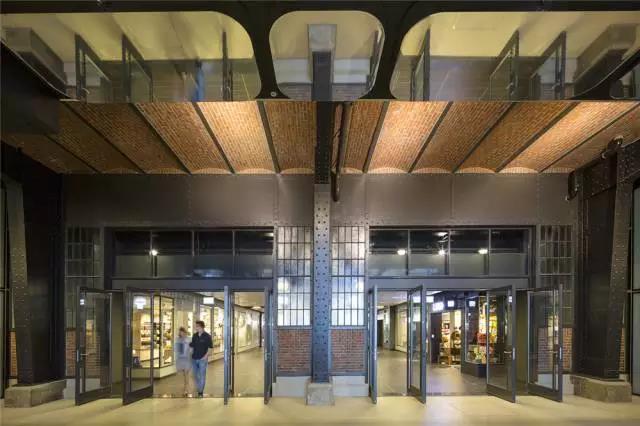
(c) Jannes Linders, courtesy Benthem Crouwel
并将城市与Ijriver河对面即阿姆斯特丹北部的渡口连接在一起,这是原码头区的重建工程。
and links the city to the ferries that crooss the Ij river to north Amsterdam, a redevelopment of the former docklands.
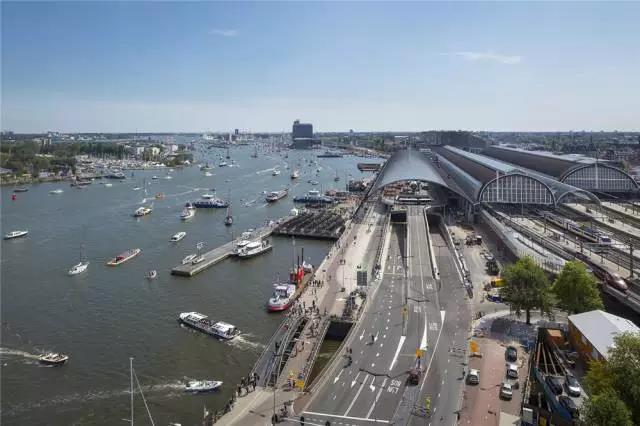
(c) Jannes Linders, courtesy Benthem Crouwel
东面是一条有顶棚的自行车道,沿途铺设蓝色和白色的瓷砖。
To the east is a covered passage for cyclists, lined with blue and white tiles.
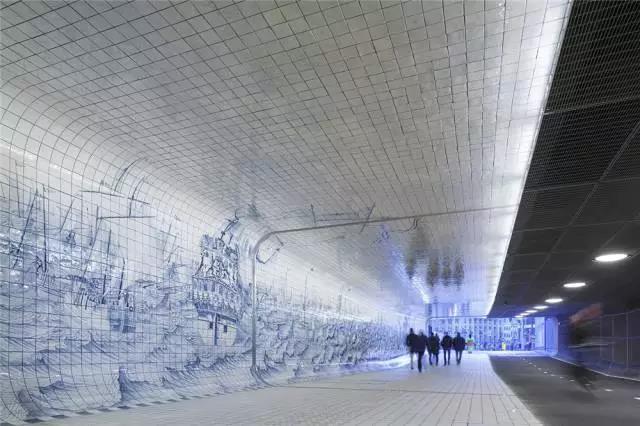
(c) Jannes Linders, courtesy Benthem Crouwel
本地和长途客车的高架车站设计了一个弯曲的玻璃拱顶,与现有的三座火车檐篷相呼应。小汽车和出租车站台被设置在最远的角落。
An elevated station for local and long-distance buses has a curved glass vault that complements the three existing train canopies. Cars and taxis are banished to the furthest corner.
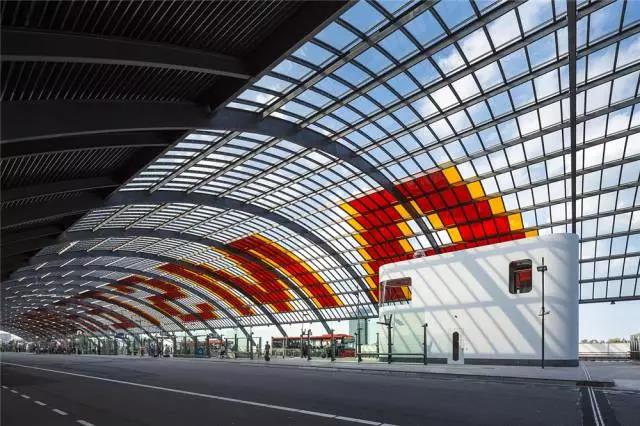
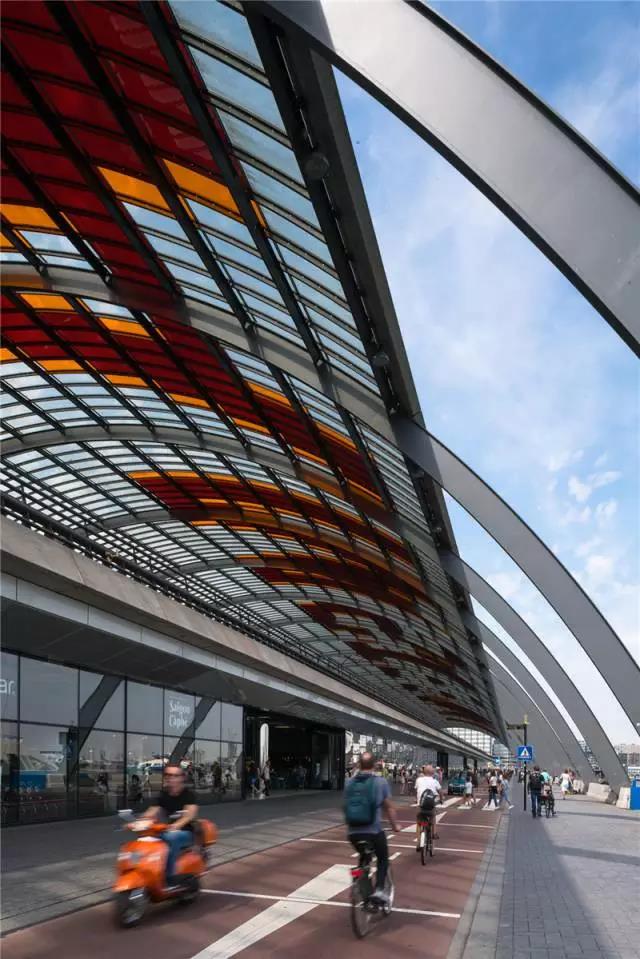
(c) Jannes Linders, courtesy Benthem Crouwel
#
乌得勒支火车站
乌得勒支拥有荷兰最繁忙的车站之一,预计客流量在未来二十年将翻番。
BenthemCrouwel扩展了原车站的简单设计设计,新加了一座天窗大厅,为站台披上波浪起伏的半透明顶蓬。
Utrecht has one of the busiest stations in the country, and the volume is predicted to double in the next 20 years. Benthem Crouwel expanded the simple diagram of the existing station, adding a skylit concourse that undulates over the platforms with their translucent canopies.
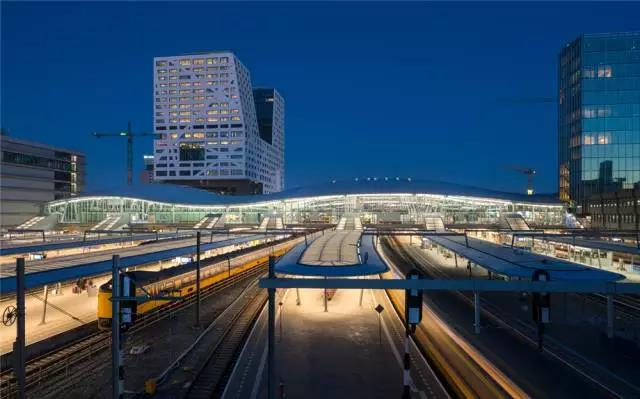
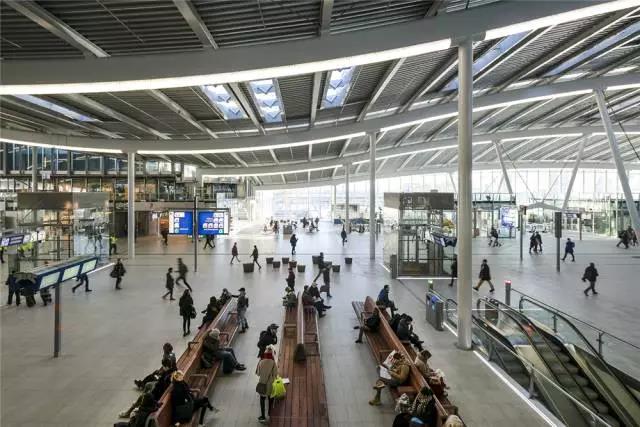
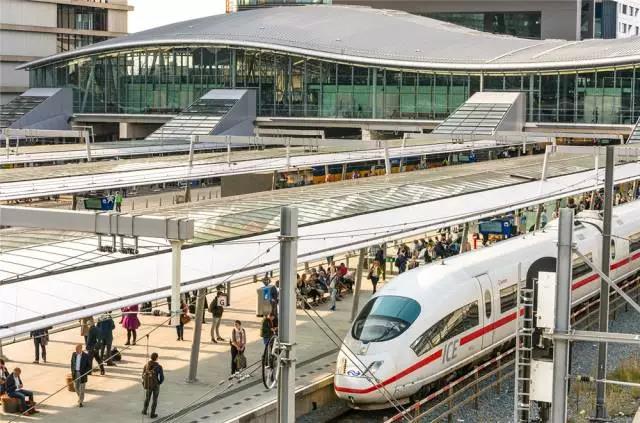
(c) Jannes Linders, courtesy Benthem Crouwel
#
海牙火车站
海牙火车站的设计是要彻底改造五十年代的车站,透过四面开放式玻璃墙体与城市互动。
In The Hague, the task was to radically remodel the 1950s station, opening it up to the city through glass walls on all four sides.
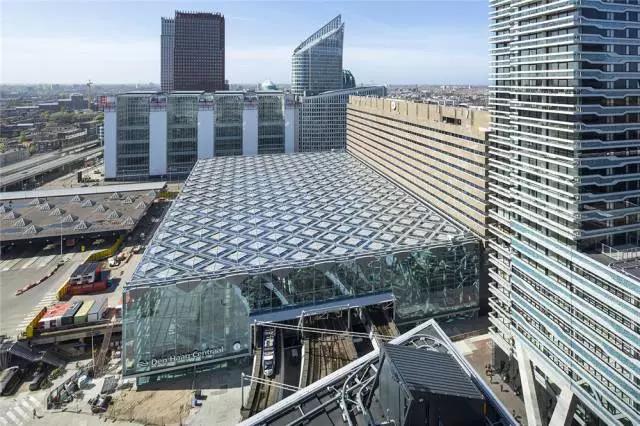
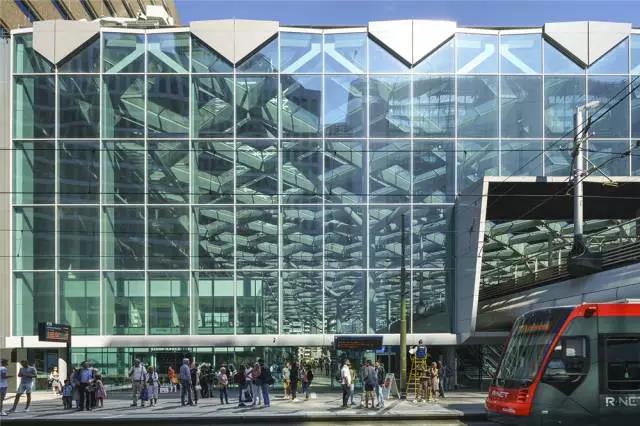
(c) Jannes Linders, courtesy Benthem Crouwel
从邻近高层建筑可以俯瞰到格栅钢和玻璃面板组成的车站平顶,这算得上是车站的第五个立面。
The flat roof of gridded steel and glass panels is a fifth facade to be enjoyed from the neighboring high-rise buildings.
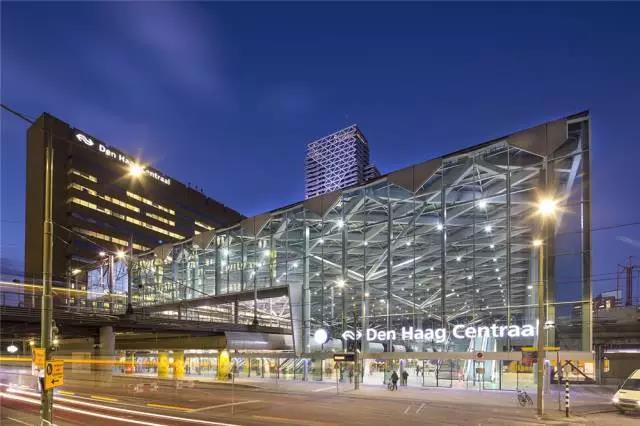
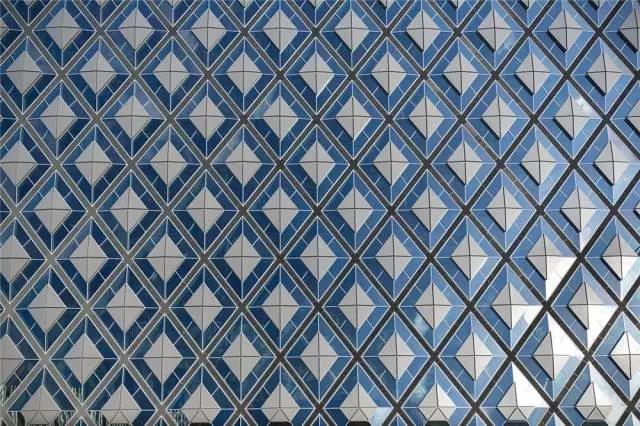
(c) Jannes Linders, courtesy Benthem Crouwel
高架的电车轨道沿对角线穿过高耸的车站大厅,为设计添上剧场感的一笔,也使车站成为一个更加紧密交织的交汇枢纽。
An elevated tramway slices diagonally through the lofty station hall, adding a note of drama and making this one of the more tightly-knit interchange hubs.
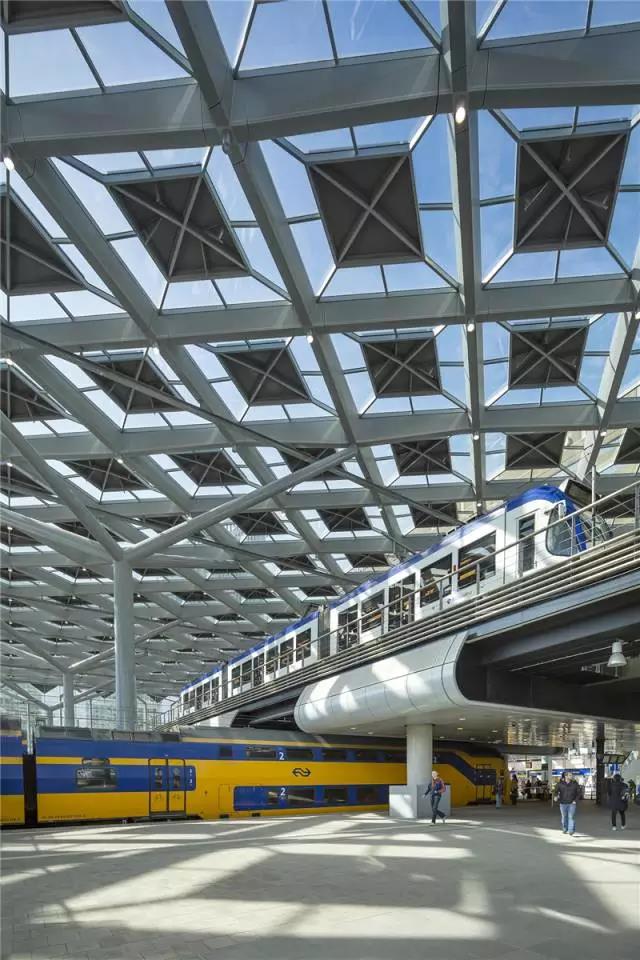
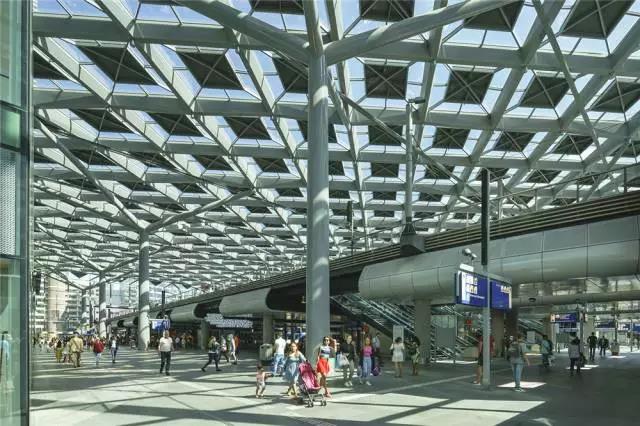
(c) Jannes Linders, courtesy Benthem Crouwel
阿纳姆中央火车站
Ben van Berkel & UN Studio
从建筑艺术而言,阿纳姆中央火车站堪称明星项目,这是一个弧形的拉丝不锈钢建筑体,没有一根柱子。本·范·伯克尔(Ben van Berkel)和他的工作室(UN Studio)花了20年的时间来总体规划、设计和改进这个由阿鲁普(Arup)建造的项目,力图实现高度的轻盈感和愉悦感。
Architecturally, the star is the Central Station in Arnhem, a sensously coiled column-free complex of brushed stainless steel. Ben van Berkel and his UN Studio spent 20 years master-planning, designing and refining this project, which was engineered by Arup to achieve a marvelous sense of lightness and exhileration.
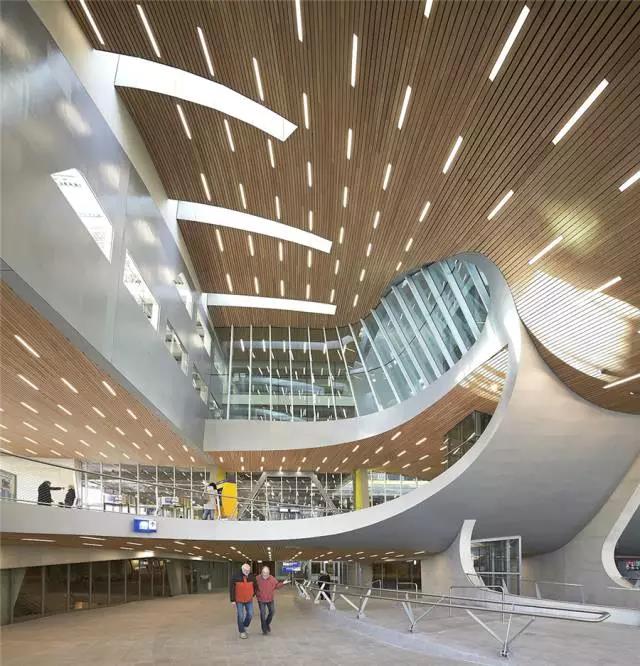
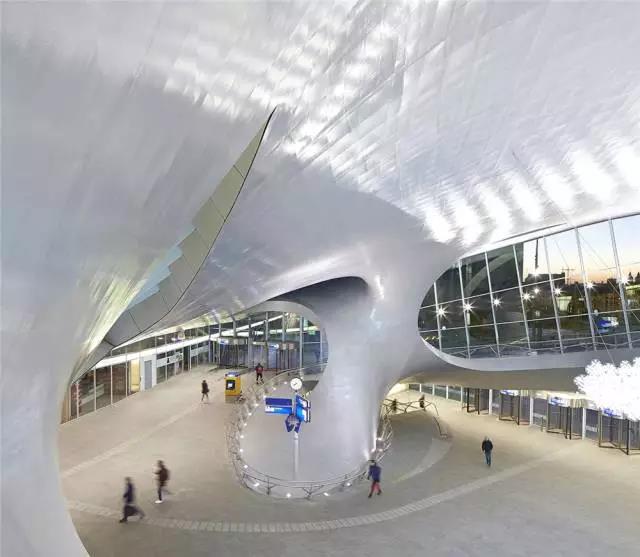
(c) Hufton + Crow, courtesy UN Studio
斜坡和浅梯连接不同楼层,光线从椭圆形天窗落下。继Saarinen(沙里宁)设计的纽约TWA航站楼(现正被改建成酒店)之后,还没有哪座建筑能让人体验到如此美妙的旅行之乐。UN工作室为这座遭遇过战时轰炸且缺少标志性建筑的城市,创造了一个崭新的地标。
Ramps and shallow stairs link the different levels and light descends from elliptical skylights. Not since Saarinen's TWA Air Terminal (now being converted into a hotel) in New York has the experience of travel been so exciting. UN Studios have created an icon in a city that was patched together after wartime bombardment and has a deficit of remarkable buildings.
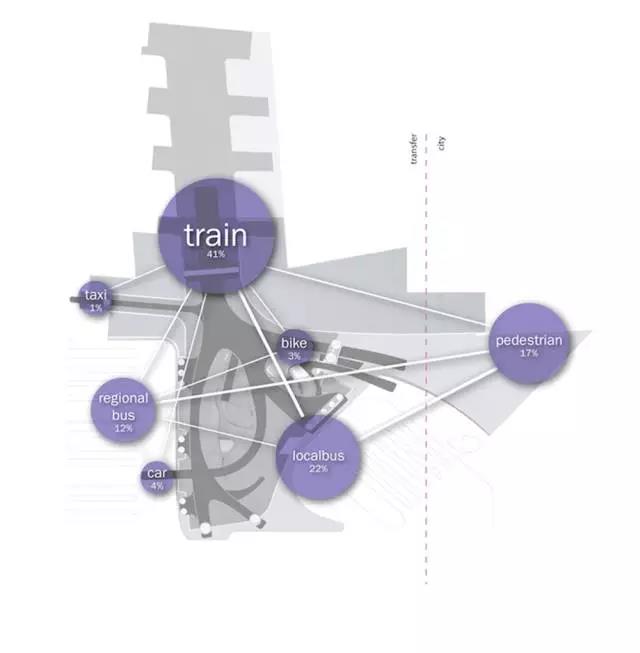
(c) Hufton + Crow, courtesy UN Studio
布雷达、代尔夫特中央车站
Koen van Velsen
The two remaining stations are more modest in scale.
剩下的两个车站规模相对较小。
#
布雷达火车站
在布雷达,考恩·凡·维尔森(Koen van Velsen)利用他身为前国家铁路建筑师的规划专长,建造了一座传承荷兰南部传统砖结构的火车站。
In Breda, Koen van Velsen drew on his planning expertise as the former National Railway Architect to construct a station that takes its cues from the traditional brick architecture of this southern Dutch city.
#
代尔夫特中央火车站
代尔夫特的中央车站甚至更加在地化。本土设计公司Mecanoo设计了一个微小弧度的拱形铝翅穹顶,印有复古的城市地图。
Delft's central station is even more site specific. The locally based firm of Mecanoo, designed a shallow arched vault of aluminum fins printed with a vintage map of the city.
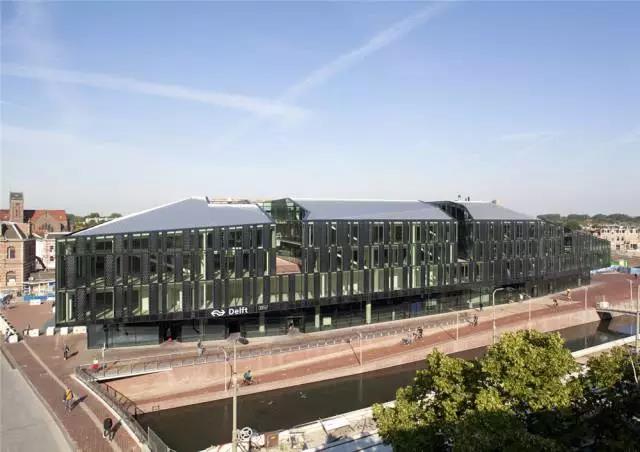
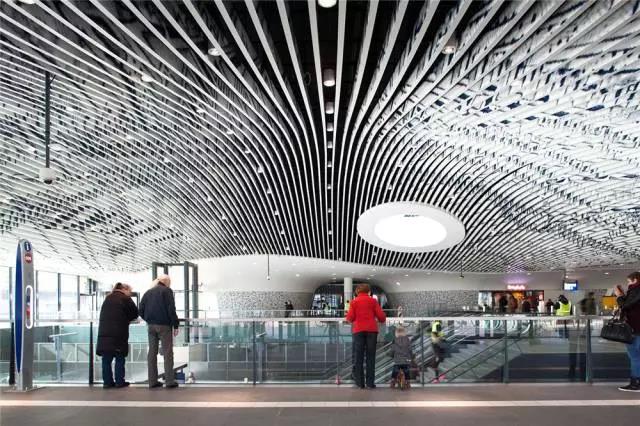
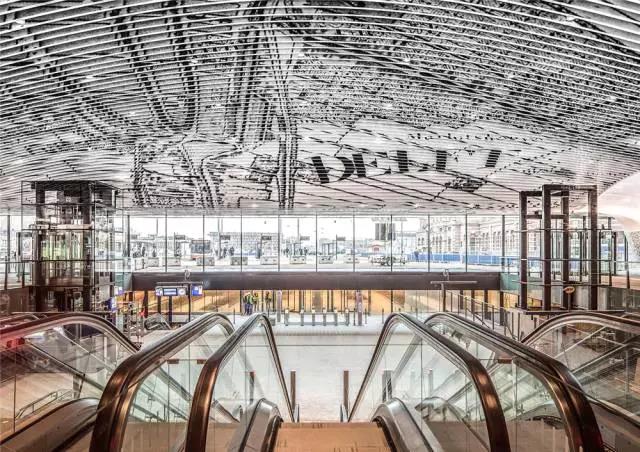
courtesy Mecanoo
他们将这座古城久负盛名的蓝色和白色瓦作提炼为设计元素,围合出氛围亲切的大厅。BenthemCrouwel负责设计下方的站台,建筑物向上延伸到市政办公室,正对着透明色和黑色相间的熔融玻璃板。
They abstract the blue and white tilework for which this historic city is famed and enclose an intimate concourse. Benthem Crouwel were responsible for the platforms below, and the building is extended upwards with municipal offices, faced with alternating panels of clear and dark fused glass.
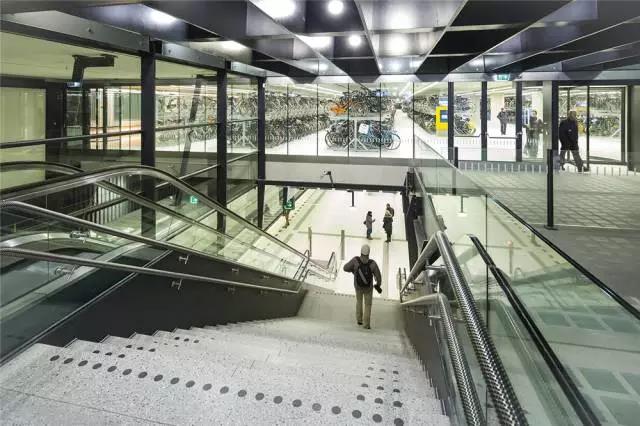
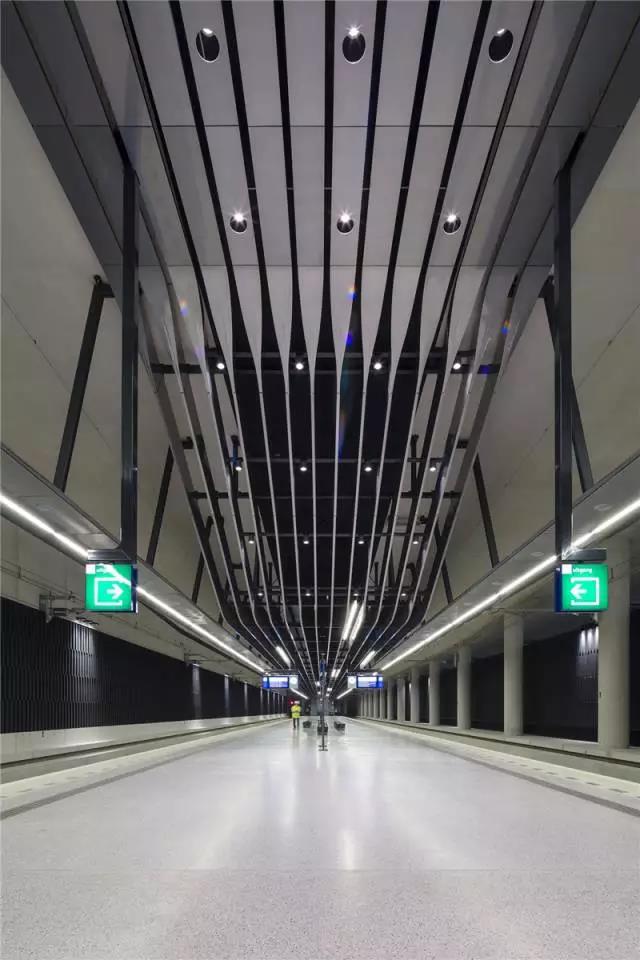
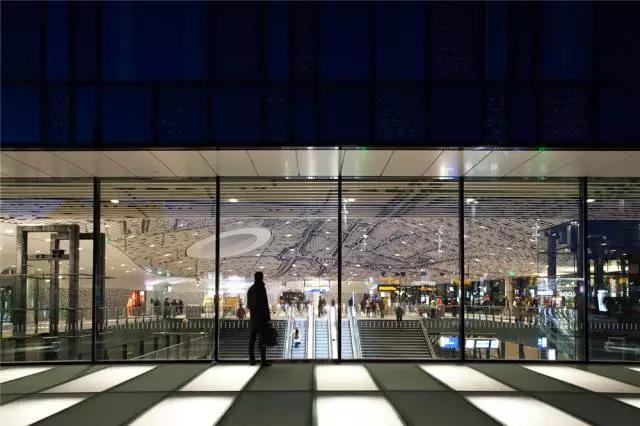
courtesy Mecanoo
这七个车站共同展示了荷兰人解决问题(这个国家一半土地在海平面以下)的独有天赋和根植于民族血液的设计基因。
Together, these seven stations demonstrate the Dutch gift for problem-solving (half the country lies below sea level) and the sense of design that is deep rooted in the nation's DNA.
文章来源:微信公众号UED城市环境设计
文章来源:微信公众号UED城市环境设计
